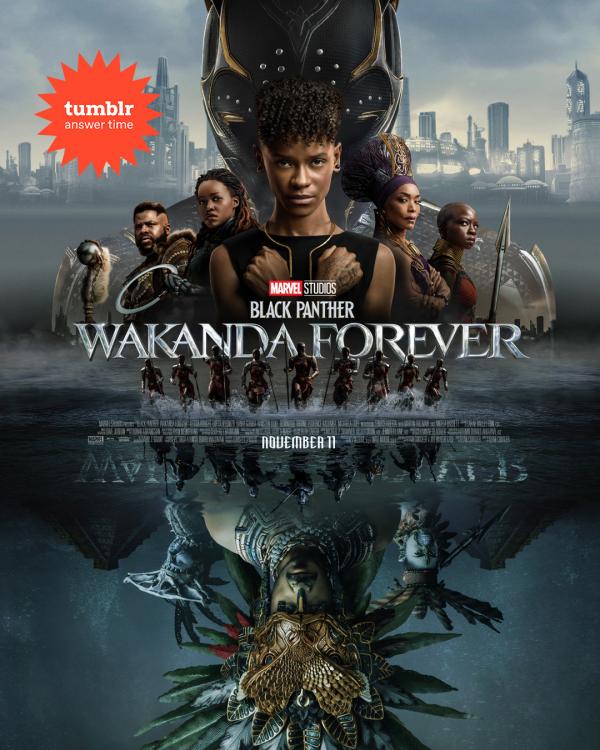-
Posts
2,415 -
Joined
-
Last visited
-
Days Won
91
Content Type
Profiles
Forums
Blogs
Events
Everything posted by richardmurray
-
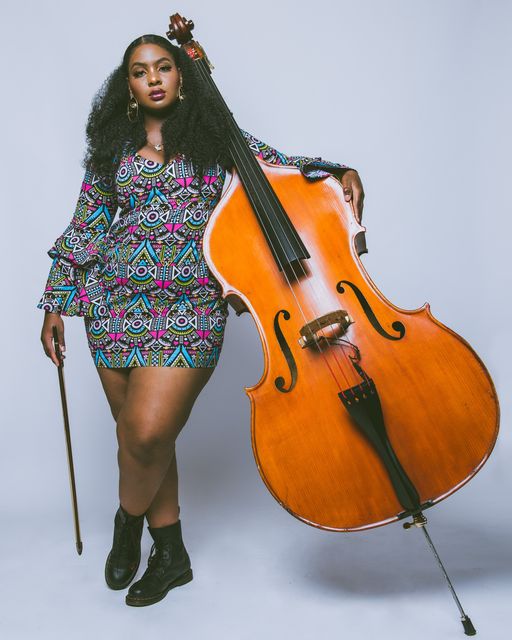
The Cincinnati Symphony Orchestra has announced Endea Owens as its 2023 MAC Music Innovator. Owens is an award-winning bassist known for her vibrancy and international array of musical projects and collaborations. Endea is the bassist for singer Jon Batiste’s band Stay Human, house bassist for The Late Show with Stephen Colbert, and creator of The Community Cookout initiative, which brings hot meals and free music to communities in need.
Learn more about Endea and the MAC Music Innovator residency with the following article
Announcing Endea Owens as our 2023 MAC Music Innovator
CINCINNATI, OH (November 10, 2022)—The Cincinnati Symphony Orchestra (CSO) announced Endea Owens as its 2023 MAC Music Innovator. Owens is an award-winning bassist known for her vibrancy and international array of musical projects and collaborations. Endea is the bassist for singer Jon Batiste’s band Stay Human, house bassist for The Late Show with Stephen Colbert, and creator of The Community Cookout initiative, which brings hot meals and free music to communities in need.
The Orchestra’s MAC Music Innovator is a year-long music residency that works to showcase and highlight Black leaders of classical music. Selected musicians embody artistic innovation and a passion for community engagement and education. With support from the Multicultural Awareness Council (MAC), a volunteer group that supports audience engagement initiatives with the CSO, the MAC Music Innovator will collaborate closely with the CSO’s Diversity, Equity and Inclusion (DE&I) and Learning departments to create a distinctive residency with educational and community engagement programs. During her time as the MAC Music Innovator, Owens will engage with area students, community partnerships, chamber performance opportunities, and a culminating orchestra performance with the CSO.
“We are excited to have Endea Owens as our 2023 MAC Music Innovator,” said Jonathan Martin, President and CEO of the CSO. “Her musicianship and heart for community, as evidenced by her work as the founder of The Community Cookout, are admirable. She is already a role model to young people who dream of carving a path for themselves in music, and we look forward to seeing the impact that Endea will bring to students in our schools and the greater community.”
“I am deeply honored to be chosen as the 2023 MAC Music Innovator by the Cincinnati Symphony Orchestra,” said Owens. “The CSO's dedication towards both music and community is nothing short of amazing, and being selected as a MAC Music Innovator is something that I hold very dear to my heart. Growing up, I rarely had the opportunity to see live performances of any kind due to many variables. Now with the help of the CSO, I can be a part of the change that I've always wanted to see. I am excited to perform alongside so many incredible musicians and bring classical music, jazz, free meals, and joy to people from so many communities. The true spirit of music always begins with the people.”
Endea Owens is the 6th MAC Music Innovator since the residency’s creation in 2018, following violinist Kelly Hall-Thompkins (2018), pianist Michelle Cann (2019), composer and drummer Mark Lomax (2020), composer and pianist William Menefield (2021), and conductor Antoine Clark (2022).
ENDEA OWENS
Known as one of jazz’s most vibrant emerging artists, Endea Owens is a Detroit-raised recording artist, bassist, and composer. She has been mentored by jazz icons such as Marcus Belgrave, Rodney Whitaker, and Ron Carter. She has toured and performed with Wynton Marsalis, Jennifer Holliday, Diana Ross, Rhonda Ross, Solange, Jon Batiste, Jazzmeia Horn, Dee Dee Bridgewater, Steve Turre, and many others.
In 2018, Endea graduated from The Juilliard School, and joined The Late Show with Stephen Colbert as a member of the house band, Stay Human. Since then, Endea has won an Emmy, Grammy Award, and a George Foster Peabody Award. Endea’s work has appeared on Jon Batiste’s Grammy Award-winning album We Are, the Oscar-nominated film Judas and the Black Messiah, and H.E.R’s widely acclaimed Super Bowl LV performance.
Endea has a true passion for philanthropy and teaching. She has taught students across the United States, South America, and Europe. In 2020, Endea founded the Community Cookout, a non-profit organization birthed out of the Covid-19 pandemic, that provides meals and music to underserved neighborhoods in New York City. To date, Endea’s organization has helped feed close to 3,000 New Yorkers, and has hosted over a dozen free music concerts.
In 2022, Endea composed an original piece about the life of Ida B. Wells entitled “Ida’s Crusade” for the Jazz at Lincoln Center Orchestra, which was also performed by the NYO Carnegie Hall Orchestra. Endea has also written for brands such as Pyer Moss and Glossier. Endea is set to premiere a newly commissioned work with the Cincinnati Symphony Orchestra, and will serve as the 2023 MAC Music Innovator with the organization. In addition to her work with the Cincinnati Symphony Orchestra, Endea is the curator for the National Arts Club and also a fellow for Jazz is Now! with the National Jazz Museum in Harlem, where she presents original compositions, curates series, and headlines performances for the 2022-2023 season. Endea’s debut album “Feel Good Music” is set for release in early 2023.
Article
Endea Owens and The Cookout: Tiny Desk Concert from NPR videos
-
The Honey
Wakanda- yes, do I have artistic issues... I have artistic issues with everything in art. But, I am overhjoyed of this financial news. Happy for all the Black folk involved first, but everybody else as well.
https://www.hollywoodreporter.com/movies/movie-news/black-panther-wakanda-forever-box-office-sequel-1235260713/The Pot
When I look at it, barring SChrumpf's death. Biden has the most important role in Schrumpf not making a comeback to the White House.
Can Biden succeed in two years?
https://twitter.com/NEWSMAX/status/1592709116715094016
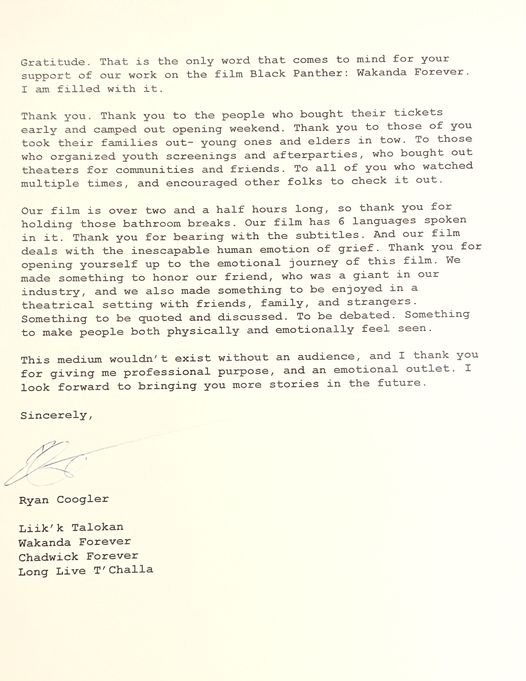
-
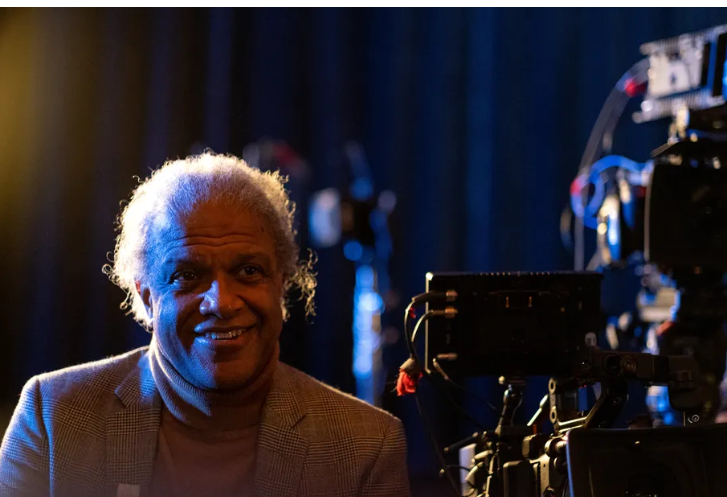
Elvis Mitchell on the set of Is That Black Enough For You?!? Hannah Kozak/Netflix
Hollywood’s Black film problem, explained by Elvis Mitchell
The venerated film critic on the unheralded Black influence on everything from soundtracks to Don’t Worry Darling.By Alissa Wilkinson@alissamariealissa@vox.com Nov 11, 2022, 7:30am EST
Over the past few years, movies like Black Panther and Get Out have raked in both accolades and box office returns, and the Oscar nominations hit new diversity records. To the casual observer, it may seem like Hollywood has made massive strides in moving from being overwhelmingly dominated by white actors, directors, and writers and toward a more inclusive environment. But from the standpoint of history, it’s startling how little has changed — and what that tells us about the industry.
That’s why Elvis Mitchell’s documentary Is That Black Enough For You?!?, which starts streaming on Netflix on November 11, is so revealing. The veteran critic and journalist, a former New York Times film critic, has, among many other pursuits, hosted KCRW’s phenomenal interview show The Treatment since 1996. He brings a wry and curious lens to the history of Black film in Hollywood, weaving interviews with renowned Black actors and filmmakers from Harry Belafonte to Zendaya into his own story. In so doing, he challenges many of the settled ideas about the film canon, Hollywood history, and what it’s meant to be a Black artist on screen.
I met Mitchell at a hotel on Manhattan’s Lower East Side to talk about those matters and a lot more. I wanted to ask him about Hollywood’s claims to inclusivity, about the still-common axiom that “Black films don’t travel,” and about why all of this history is really not so different from today. Our conversation has been edited and condensed for clarity.
Alissa Wilkinson side Elvis Mitchell interview BEGIN
Alissa Wilkinson
You say in the film that Hollywood appointed itself “the myth-maker” for the world. Early studio heads saw themselves as the guardians of America’s morality and morale, and the exporters of a message about America to the world.
But as you demonstrate, the story Hollywood told about Black people was often demeaning, and very far from the truth. What kind of an effect does that have on the myth that the country and the world internalize?
Elvis Mitchell
I think [Hollywood] was unique to film culture, different from any place else in the world. American movies were made by people who fled [their home countries] under enormous persecution, and then decided to create out of whole cloth this ideal of what America was — this America that they wanted to come to. And the America that they created is still being seen — it’s something popular culture is still responding to.
We noticed as we were putting the movie together that so many of the people on camera — Samuel L. Jackson, Suzanne de Passe, Charles Burnett, Laurence Fishburne — talked about Westerns. The myth became that there was never a Black person on a horse. That would have been empowerment; as soon as you put a Black person on a horse, you’re saying that they have some control over where they’re going, literally, within their lives. We can’t do that.
Back when Paul Thomas Anderson was talking about his film Boogie Nights, he talked about how absurd the idea of a Black cowboy is. So even Paul Thomas Anderson has been kind of rolled under by the idea the movies have created about what cowboys are supposed to be, rather than what they actually were.
So much of Black culture has been about responding to myths created about Black people through various forms of media. That response came from actors as much as filmmakers, because so many of these movies are not directed by Black people. Actors took some claim over [reclaiming the truth about being Black], and that confidence and that brio becomes this really transfixing quality.
Alissa Wilkinson
But it’s not just about telling America what it is, or what its own history is, but also exporting an idea of America and its history to people who aren’t American. My sense as a film critic is that we still see the reverberations of world perceptions of American Black culture through that influence.
Elvis Mitchell
That gets to this message that’s constantly pushed in Hollywood — that Black film won’t sell overseas.
Alissa Wilkinson
Exactly.
Elvis Mitchell
This shibboleth that exists to this very day, one that was constantly fed and cared for, that Black movies “don’t travel.” But think about [renowned Senegalese filmmaker] Ousmane Sembène in Africa, seeing what Ossie Davis is doing [in America], or seeing 1972’s Sounder, and being inspired by that, and creating his own ... I’m not going to say mythology, but his own worldview about Black masculinity. When that’s missing, what does that do to the culture?
It’s very convenient to say, “This stuff doesn’t travel.” Because it’s still this peculiar view of Black culture, even though it seeps in and subsumes everything. When you hear somebody on Fox say “24/7” — that’s hip-hop. They’re terrified by the “fist bump,” but they’ll say something is happening “24/7,” and thus they’re missing the entire point of their argument.
Alissa Wilkinson
Yes — here Ossie Davis is making films like Cotton Comes to Harlem and Black Girl, with roles in which Black characters can exercise self-determination, and it sparks something for filmmakers because their imaginations are expanded.
At the same time, though, you bring up that Sidney Poitier was, at one point, the number one box office draw, and yet Hollywood executives couldn’t imagine that any other Black actor could also be popular with a broader audience. The thinking is that it’s just Poitier; it’s an exception, it’s an anomaly, it’s just this one guy.
It reminded me of how people talk about huge, massive hits like Black Panther or Get Out today. There’s still a reluctance to greenlight big-budget Black films, because the thinking is, “Oh, well, that was a fluke.”
Elvis Mitchell
And what happens? We get a white remake of Get Out, called Don’t Worry Darling.
Alissa Wilkinson
You said it.
Elvis Mitchell
So at the same time, we have to be careful about the way we deal with Black film, because [Hollywood doesn’t think there are] “genres” in Black film; it’s just “Black film.” So when any Black film fails, it is a “Black film” that is failing, not that movie.
I remember when Black Panther came out, I talked to so many people, including Oprah, who said, “This is going to bring in a whole new way of [making] film.” No, it’s not. Because what happens when a film succeeds in a major way? It’s imitated. How many Jurassic World [imitations] have there been since the first Black Panther movie? And now, how many imitations of Black Panther have we seen? The answer is none, because they’re still treated as if lightning struck.
Alissa Wilkinson
Absolutely. Hollywood loves to make big creature movies, even if none of them hit quite like Jurassic Park. And this goes to something I think about a lot, which is that Hollywood is fundamentally conservative. Often people think of Hollywood as a very progressive, forward-looking industry, but it’s risk-averse and prone to sticking with whatever they know — which becomes a problem when what you know is stuck in some false idea of reality.
Do you think the reluctance to mainstream Black film in the industry is due to failure of imagination, built-in biases that they’d be horrified to be accused of, or what?
Elvis Mitchell
How much time do you have? Let’s send out for lunch.
To your point, Hollywood is a community that thinks of itself as being incredibly liberal, except when it comes to exercising that liberal impulse. Maybe they think their liberalism and commerce are two different things, but no, they’re not.
While we were trying to get [Is That Black Enough For You?!?] going, it got shut down by Covid; this was all happening at the same time that the country was reeling from the George Floyd attack, and the responses to that.
Back then, I would get these calls, saying, “So we want to put together this blue ribbon panel to figure out what we can do to make things [in Hollywood] different.” Look, we don’t need a panel. I don’t have time for this. I have three words for you: Hire Black people. It’s as simple as that. And not just one [Black person], but several, so the one person doesn’t have to labor under the burden of having to explain all of Black culture.
Alissa Wilkinson
Your film feels a little bit like a story about all the people who have been told that something “simply isn’t done” or “just can’t be done.” But when it is done, it’s a wild success — like Melvin van Peebles self-financing Sweet Sweetback’s Baadasssss Song because no studio would make it, and then it being a huge, era-defining hit. I sort of feel like that might apply to your own film — am I right? I can imagine people saying, “We can’t do this, nobody’s going to watch it, nobody’s going to be interested.”
Elvis Mitchell
People in effect said that when they turned down this same material in a book pitch. I thought, oh, this is the kind of thing that could go on a bookshelf next to Easy Riders, Raging Bulls, or Pictures at a Revolution. This isn’t esoterica. I’m not talking about a wave of art films.
In fact, these movies are not only enormous successes as movies, but they also created these soundtracks that were enormous successes, and then were imitated in ways that were enormous successes.
People who know and understand film history say, “Why hasn’t this documentary happened before?” I say, “I don’t know. If a tree falls in the forest, and there’s nobody to hear it, is that a legacy?” I mean, this is what this comes down to. I hate to torture a metaphor like that, but if it’s not reported on, then it’s not a legacy — if it’s not examined, if there’s not context offered.
Alissa Wilkinson
I think a problem is that people get very emotional and defensive when you threaten their canon, their idea of who did what first.
Why do you think this is?
Elvis Mitchell
There is this consistent boxing up of Black film culture. It’s this. It’s solely this. It is only this. It is Sidney Poitier. It is Black filmmakers finally getting a chance to work in the 1960s. It’s this thing that Melvin van Peebles has tried to fight his way, and then after that Spike Lee, and Robert Townsend, and so many filmmakers.
One of the reasons I wanted to present the idea of the dangers of canonical thought is that nobody tends to think about blackface in Alfred Hitchcock, in the 1937 film Young and Innocent. I remember seeing that as a kid, and thinking, “Oh my god, there’s blackface in an Alfred Hitchcock movie?” Or there is this idea in canonical thought that 1939 is the greatest movie era in American movie history. Some of us disagree with that.
Alissa Wilkinson
But it’s accepted as fact, along with the idea that a set of white filmmakers changed film in the early 1970s. There’s truth to it, but there’s more to the story.
Elvis Mitchell
They end up feeding into that river of myth. “These filmmakers came and changed everything” — well, they did sometimes, but they didn’t exist in a vacuum.
Alissa Wilkinson
Getting a chance to see these things on screen, in front of me, might be what’s good about doing this in film form instead of a book. I had honestly never really been struck by the similarities between depictions of Mickey Mouse and minstrelsy, but of course, it was obvious once you showed it to me in the film.
Elvis Mitchell
This feels like this innocent thing. In fact, it is not. Or, I’m not going to say it’s not innocent, but certainly there are layers to this that need to be pulled away, so we can see the entirety of it.
Mickey wasn’t keeping on gloves so he doesn’t leave any clues for a CSI team or something. “These are Mickey Mouse’s fingerprints, now we know who killed him.”
Alissa Wilkinson
Music is really important to this film, and it’s especially interesting to hear about how releasing a soundtrack before the movie’s release — pretty common now — was virtually unheard of before Super Fly.
Elvis Mitchell
By releasing the soundtrack [before the movie], and having it be such an immediate success, it created a must-see feeling around the movie. And it was constantly being played. If you drove around LA, you heard the commercial for the release of Super Fly. People respond to these songs, and then go out and buy the soundtrack. It is that rare case where you had people listen to the soundtrack before they saw the movie. So they created their own movie in their head through Curtis Mayfield’s soundtrack. And the movie, in some ways, couldn’t live up to that movie they created in their head.
Let’s be honest, those songs are better than the movie. There’s great stuff in the movie, but as a dramatic creation, as a narrative with its own life, that soundtrack is extraordinary. The soundtrack was a huge artistic and commercial success, and every song was released as a single. This isn’t like you’re making A Hard Day’s Night, and the Beatles are already a hit; this is something that becomes a mainstream hit that then propels the movie to enormous success. Shaft followed its example, and it started to happen so much that by the time Saturday Night Fever was coming out, they had the soundtrack out two months before the movie.
Then music videos also started coming out before the movie, and that became the coin of the realm for the ’80s, that the soundtrack was as important, if not more so, than the film. Super Fly did that.
Alissa Wilkinson
Now that’s all TikTok, 10-second clips. This summer the music from Baz Luhrmann’s Elvis started circulating on TikTok before the movie came out. I’m not even sure people knew what it was from, or that the “Hound Dog” remix was based on an Elvis song.
Every year I’ve been doing this job, and especially when Oscar season arrives, the industry starts touting how far they’ve come in terms of inclusivity — the whole #OscarsSoWhite issue having pushed it recently. That is, frankly, embarrassing, when you actually look at who gets jobs and who wins awards.
Elvis Mitchell
Here’s the example. Suzanne de Passe was nominated for Best Original Screenplay in 1973 [for co-writing Lady Sings the Blues]. How many other Black women have been nominated since that, in that category? None.
So when people would say to me, “Are you afraid this documentary’s going to seem dated?” No.
My fear is that it will never seem dated. In the film, Zendaya says, “It’d be great to see Black kids playing together on camera, or to see more Black people in a sci-fi fantasy.” Was that going to seem like old hat by the time this movie came out? No.
It’s weird to show this history to young people and have them go, “God, nothing has changed.” This is the thing that I wanted to try to find a way to deal with, too: Every decade we hear about this “resurgence in Black film.” But where did it go? It didn’t go anywhere; it just wasn’t being covered.
To your question, maybe in some fundamental way things have changed, but it’s still about trying to wrest some control of this narrative. Certainly, the visibility of the phenomenon may change, but Black women aren’t getting opportunities to write movies. It’s as simple as that.
It would be fun to say, “Well, god, in the three years since I’ve started working on this, so much has changed.” No.
Alissa Wilkinson side Elvis Mitchell interview END
Is That Black Enough For You?!? premieres on Netflix on November 11.
ARTICLE
https://www.vox.com/23447401/elvis-mitchell-black-enough-interview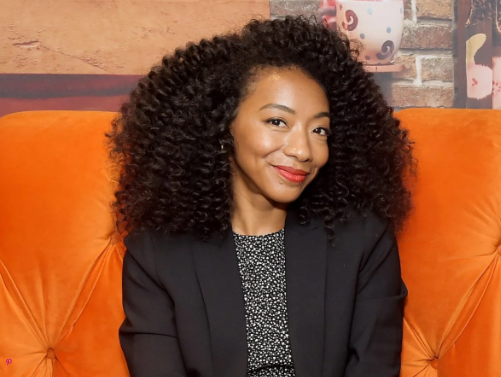
Unknown photographer
Betty Gabriel: The Unsung Black Scream Queen
"THERE IS A LOT OF HORROR WITHIN THE BLACK FEMALE EXPERIENCE IN THIS COUNTRY," THE ACTRESS SAID. "THERE IS A LOT TO BE MINED THERE."BY RIVEA RUFF · UPDATED OCTOBER 28, 2022
When the term “scream queen” is brought up annually around this time, images of white women narrowly escaping the clutches of a crazed killer or evil entity across film franchises or pivotal genre entries come to mind. Jamie Lee Curtis as Laurie Strode, locked in a 45-year-long battle against Michael Myers. Neve Campbell as Sidney Prescott, opposing the various murderers donning the famed Ghostface mask in the Scream franchise. Naomi Watts as the longsuffering mother fighting supernatural forces in The Ring and Shut-In, or scratching for survival in Funny Games or Goodnight Mommy.Less often mentioned are the contributions that Black women have made to the genre. Marlene Clark’s conflicted bloodthirst in 1973’s Ganja & Hess. Rachel True‘s vengeful teenage witch in 1996’s The Craft. Naomie Harris as a post-Apocalyptic warrior in 2002’s 28 Days Later.
But perhaps the most prolific yet often overlooked of these in the current era of horror is Betty Gabriel.
Starring in titles like violence thriller The Purge: Election Year, futuristic sci-fi/horror Upgrade, Screenlife slasher Unfriended: Dark Web, cybercrime horror-thriller limited series Clickbait, and of course, Jordan Peele’s innovatively genre-pushing racial horror, Get Out, Gabriel has broken the mold of the disposable Black friend of the protagonist or the film’s first victim.
Gabriel’s performance as “Georgina,” the white grandmother of villain Rose Armitage (Allison Williams), inhabiting the body of an unnamed Black woman, is one of the most iconic in the genre’s history, hands down. Though she had only a handful of lines in the film, her spine-tingling, smiling-yet-tearful monologue about the kindness of the Armitage family is one of the most recognizable frames of the film. Subtle yet chilling, it’s the strongest clue of the horror at the root of the story before the hand is revealed in the film’s third act. And it helped set the tone for a renaissance of Black horror that has begun over the last 6 years.
“I hadn’t really been aware that my contribution to the horror genre was significant in any way,” Gabriel says in conversation with ESSENCE about her status as a staple of modern horror. “I take it with gratitude.”
Ironically not much of a horror film watcher herself – “I will get nightmares,” she says laughing – Gabriel fell into starring in a string of scaries by pure happenstance.
“Starting out, you don’t really have much of a choice. You just take whatever work you can get,” the actress says. “Blumhouse, which was the main producer behind a lot of these films, kept hiring me, and I kept on saying yes to them. It wasn’t like I had a choice between this and a rom-com. It was a choice between this and not working.”
“But I think perhaps on a subconscious, universal level, there is something about me that is drawn to these films, or they’re drawn to me.”
Her first foray into chills and thrills came in 2016, for the second sequel in the wildly popular dystopian action horror franchise, The Purge: Election Year. Playing on societal fears over the turn the nation would take during the election cycle taking place in the real world just months later (and preluding some real-life political horrors that came about during the next Presidential term), the film tackled topics of politics and policy through the lenses of race, class, and religion – with a healthy dose of violence and mayhem, of course.
Gabriel portrayed Laney Rucker, an ex-purger known as “La Pequeña Muerta” in her youth, now an EMT assisting victims of violence each purge night, fighting to keep a peaceful senator in line for presidency alive for the night with the hope of Purge eradication on the horizon.
“It’s something I don’t really like to consume as an audience member, but as an individual, these are things that I definitely am haunted by,” she says of her connection to the material. “Just complete and utter chaos, the breakdown of our system, the guns constantly being a part of our everyday reality, and oppression.”
“It’s one of those movies where it’s like, ‘Is this horror? Or is this just a really messed up version of reality that might come true, that kind of [already] is true?'”
But her true big break into horror icon status came after a pretty harrowing audition process for Blumhouse’s new horror feature, written by that one comedian from Key & Peele.
“I was backpacking through the mountains of Peru, as one does when you’re soul-searching and single,” she reveals. “So, I didn’t have any technology, no smartphone, no wifi, nothing. I was going to an internet cafe once or twice a week, paying 10 cents for an hour for internet, and I got the email audition notice.”
Initially inclined to pass the process up, with no access to camera equipment, internet access, or even too many other people around who knew English, Gabriel tried to let this one go and move on. But something about the opportunity wouldn’t let her rest.
“I went to the hostel, and went to bed, and just couldn’t sleep. So, I just woke up and went, ‘Ugh…I’ve got to figure this out. I’ve got to figure out how to get that tape in. I can’t pass this up.'”
That realization led to a 24-hour bus ride to the next village over to visit a documentary filmmaker she stumbled across through a referral on Facebook, who not only had access to all the equipment she needed to film and upload her audition for the role but was from Chicago and knew English.
“We actually shot it outside. There were birds chirping throughout the whole thing,” she laughs. “12 hours later, it was uploaded and submitted.”
The rest, of course, is horror movie history. Get Out led to a renewed interest in horror films centering Black protagonists in authentically Black experiences, making way for films like Spell, His House, 2021 reboot sequel Candyman and shows like Lovecraft Country and Them.
“I think that ultimately, we’re being more inclusive, and we’re being a bit more aware in how we don’t fully invite people to the table,” Gabriel says of the increased space that’s been made for Black people in the horror genre. “And I do mean certain ‘we’s.’ The ‘we’s’ in power. We pat ourselves on the back for issuing crumbs. In any genre, I hope it isn’t a trend. Hopefully, we see more beautiful Black women on screen.”
Beyond the expression of horror in front of the screen, Gabriel is hopeful that the trend toward stories told by Black creators and about Black experiences continues, with increase.
“I think with the horror genre in particular, there’s so much to be mined there, because there is a lot of horror within the Black female experience in this country,” she says. “I look forward to that being conveyed, and in a way that’s profound, and not necessarily [gratuitous].”
Like many modern film watchers, Gabriel has a hard time viewing “Black struggle” and racialized violence against Black bodies committed to screen, though she sees the horrific stories they portray as valuable expressions.
“I do find myself not able to watch certain stories that really focus on slavery. I just find it challenging and retraumatizing. But that’s not to say that they’re not important and that I don’t try,” she said. “And, there’s always an audience for any story.”
“Personally, I think there’s something [special] to striking a balance between horrifying images, and transcendent nuances that we don’t always think about or see. Or things maybe we know on some level, but we haven’t quite seen [conveyed].”
“I look forward to seeing horror evolve in general. I personally am drawn to subtlety, with lots of layers and complexities about the human experience,” she continues. “I think that’s what made Get Out so wildly successful was that everyone related to this protagonist. Even though a white person will never know what it is to be a Black person, something about that journey was relatable and universal. So, I hope that is the future of horror, with Black stories and Black people behind and in front of the camera.”
Indeed, as Get Out opened Hollywood’s eyes to the bankability of Black horror, it opened doors personally for Gabriel, who has gone on to star in 17 more projects since the film’s release, 4 of which fall into the horror genre. The actress revealed that her role as Sophie Brewer in Netflix’s cyber-kidnapping thriller Clickbait, was the most pivotal on her journey through the genre.
“For me, that was the most personal, because it was the most extensive journey that I had been on playing a character,” she says. “It was my first time playing a lead, and though it wasn’t my first time playing a mom, I was a mother who had to really be the mother and keep the family together, while also having all these secrets and all this shame that she was processing and dealing with.”
Though the actress was considering stepping away from horror altogether in an effort to avoid typecasting, another horror project from a director of color recently came her way that was simply too good to pass up. Now presented with a choice, she chose horror once again – this time from another BIPOC perspective not often seen in American theaters.
The as-yet-untitled horror slated for a 2023/24 release comes from Indian director Bishal Dutta and centers on ancient Indian legends and personal immigrant experiences, subject matter which is likely to resonate with Black viewers just as much as our South Asian brothers and sisters. She also joins season 3 of Prime Video’s action drama Jack Ryan this November, and Discovery’s Manhunt, dramatizing the search for John Wilkes Booth in the days after Abraham Lincoln’s assassination.
“I think we’re in such an anxious place collectively that [horror is] really manifesting itself in a lot of stories,” Gabriel says. “So, yeah, I don’t think you can escape it.”
ARTICLE
https://www.essence.com/celebrity/betty-gabriel-unsung-black-scream-queen/West Coast Blues Society Caravan of All Stars - soundcheck
Videographer: Ronald ReedSGT SMOKING BLACK animated trailer FROM DEMUZ COMICS
-
-

Lupita Nyongo side Tenoch Huerta
@sensacinemx Tenoch Huerta y @lupitanyongo sacaron los pasos prohibidos en el fan event de #blackpanther2  #tenochhuerta #lupitanyongo #namor #blackpanther #blackpantherwakandaforever ♬ sonido original - SensaCine México
#tenochhuerta #lupitanyongo #namor #blackpanther #blackpantherwakandaforever ♬ sonido original - SensaCine México
-
-

Black Women, how many times in your life has a husband/boyfriend/kind male stranger massaged you in a memorable way?
The following guy makes his living giving massages.
starlitoo side mremmanuellustin
@mremmanuellustin All I want is you #emmanuellustin @itsstarlito ♬ All I Want Is You - Miguel ti3rratravels side mremmanuellustin
part 1
@mremmanuellustin I’ll be waiting for you #emmanuellustin @ti3rratravels ♬ Soon as I Get Home - Faith Evans part 2
@mremmanuellustin How do you feel ? Let me know @ti3rratravels #emmanuellustin ♬ At Your Best (You Are Love) - Aaliyah





